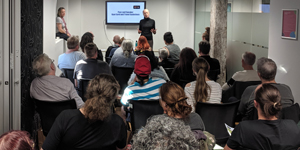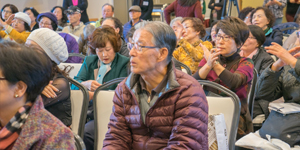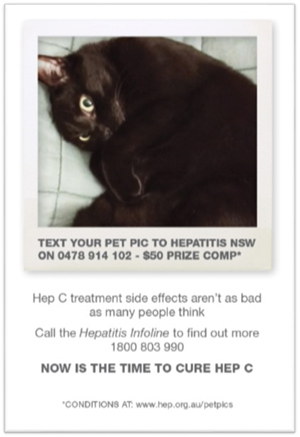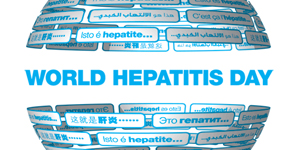The Champion #74 – Professional
This issue:
- New hepatitis C treatment data confirms time for action is now
- Live Hep C Free program update
- Peer Projects Training
- Hep B Community Education Days
- Pet Pics promote health messages
- Dave’s work placement at Hepatitis NSW
- NSW Hepatitis Awareness Week & World Hepatitis Day 2019

New hepatitis C treatment data confirms time for action is now
The latest hepatitis C treatment data by the Kirby Institute has now been released. It shows that, since March 2016 when Direct Acting Anti-Virals (DAAs) were made available through the PBS, an estimated 70,260 people in Australia have commenced treatment to cure hepatitis C.

This represents about 33% of the estimated number of people who were living with chronic hepatitis C infection at the end of 2015. While it represents a great achievement thus far, there are concerns as to whether this is enough to prevent ongoing deaths each year from liver disease associated with hepatitis C.
Our national partner, Hepatitis Australia, has noted that the data in Monitoring hepatitis C treatment uptake in Australia – Issue 10 from the Kirby Institute highlights both the progress and deficiencies in hep C treatment uptake. It is great news to see so many people have commenced treatment with most people having been cured, or on their way to being cured. While this is clearly cause for celebration the down side is that the number of people taking up treatment to cure hep C is declining.
It is known from other sources that the overall downward trend in the number of people commencing treatment has continued beyond the end of 2018. That rate is now averaging at, or below, 1,000 people per month for 2019, and this is well short of the Australian Government’s targets. Hepatitis Australia notes that, in order to address this ongoing decline, there needs to be a significant push in primary care to identify patients who may need treatment for hep C and help them achieve a cure.
Despite general practitioners (GPs) being able to prescribe the current treatments, the Kirby report shows only 29% of prescriptions are issued by GPs. This varies from state-to-state, although New South Wales is sitting very near to the national average. Nationally, Hepatitis Australia estimates this actually equates to only one in ten of all GPs prescribing hepatitis C treatment; noting that 90% of GPs in Australia need to be writing scripts for DAA treatments.
The Kirby Institute report also shows that while there has been a significant increase in people under aged 50 years accessing the curative medicines this has not been the case for older people. Hepatitis Australia says that their analysis in 2017 shows that a large proportion of people living with hep C are now aged over 50 and are not engaged in care for their hep C. Many in this older group may not be aware of the hep C cure being available or may simply be thinking that some hep C related health issues (tiredness, for example) are just a result of getting older.
Hepatitis Australia is currently working with member organisations, including Hepatitis NSW, to roll out a community education campaign targeting the older age group of people living with hepatitis C. A Test Cure Live campaign was recently run by Hepatitis Australia in Canberra and Adelaide, but they acknowledge community education is only one strategy, and can only achieve so much without support and education by the health sector. Primary care services need to come to the party and talk to patients about hepatitis. They need to be assessing hepatitis risks that may have occurred in the past, testing for hepatitis C and working with the patient to achieve a cure. Hepatitis NSW and Hepatitis Australia have consistently raised this shortfall in approach for almost two years – the time for action is now.
The Australian Government has set hepatitis B and hepatitis C eliminations targets for 2022, which are outlined in the National Hepatitis Strategies. Australia has also signed on to the global elimination targets for 2030. However there is concern that the hepatitis C treatment targets will not be achieved unless action is taken to increase prescribing in primary care settings.
It is hoped the overall downward trend in hepatitis C treatment initiations revealed in the Kirby report will prompt urgent action.
Greg Hunt, the Australian Health Minister, has committed to convening a round-table to look at why Australia has failed to stem the tide of avoidable deaths from hepatitis. It is time for the broad health and community sector to come together and help solve this problem. If action is not taken quickly to turn these figures around, Australia risks missing the global targets it has publicly committed to. More importantly, people will be missing out on a cure for their hep C, unnecessarily developing serious liver disease and be at risk of death.
- Original Hepatitis Australia statement >>> CLICK HERE
- Latest Kirby Institute Report >>>CLICK HERE
Live Hep C Free program update

This last financial year has seen Hepatitis NSW significantly increase the capacity of our peer-based healthcare access and clinical partnership program, Live Hep C Free.
The program partners our expert peer workers with hepatitis healthcare workers in settings such as methadone clinics, homelessness services, and residential rehabs. Peers engage with people accessing the service and encourage them to access the hepatitis healthcare workers on-site for testing, treatment, and care. This scale-up has seen dramatic results over the last 12 months.
- Our peers have made visits to our partner services 123 times over the last 12 months.
- They’ve engaged with 2,169 people about hep C during these visits.
- 654 of these engagements have led to a person immediately seeing our partner healthcare worker on-site.
- 344 of those seen have had screening for hep C (either a fibroscan, blood test, or both).
- 164 people have then accessed hep C treatment.
- 79 people had on-treatment or post-treatment support.
- 301 people have been referred on for further healthcare such as for existing cirrhosis or other health conditions.
What is significant about these numbers is that many of these people would not have accessed healthcare without the intervention and engagement of our team of Live Hep C Free peer workers. We’re proud of the team; they’re making an amazing contribution not just to eliminating hep C but, most importantly, meeting people where they’re at with the healthcare they need.
Peer Projects Training

Over two days in early June 2019, Hepatitis NSW welcomed our largest ever group of peers to our offices for a combined training for our peer programs – the Live Hep C Free program and the Hepatitis NSW Speaker program. We had 29 people with lived experience of hepatitis C in attendance, bringing on-board some outstanding people to add to our already wonderful peer workforce.
We’re very excited for what the 2019-20 financial year holds, with more peers getting out there to spread the word about hep C cure, to fight stigma and discrimination, to assist people into hep C healthcare, and to be a central part of the work to eliminate hep C in Australia.
To read more about the peer programs at Hepatitis NSW:
- Live Hep C Free >>> CLICK HERE
- C-een & Heard >>> CLICK HERE
Hep B Community Education Days

To raise awareness of hepatitis B (transmission, prevention, vaccination, and treatment) among Chinese-born and Korean-born Australians, Hepatitis NSW continues to hold and participate in a variety of educational community events across Sydney. Here are two from the last six weeks.
Korean Health Expo
For the second time since 2017, Hepatitis NSW successfully hosted the Korean Health Expo. Held late May at Lidcombe Dooleys Club, the event was sponsored by the Western Sydney Local Health District (WSLHD), along with the Cancer Institute, and was a success with about 160 participants.
Talks on hepatitis B and liver health were given, along with advice on using a bowel cancer screening kit, stomach cancer, and mental health management. To enhance Korean people’s healthy life styles, the acoustic guitar club performed while the line dance group gave participants a chance to dance together.
Clinical Nurse Consultant Kristen McKee from Storr Liver Centre Liverwellness Program helped with the liver scans of an eager crowd of people. The Liver Wellness Program and Jade Fan handed out close to 70 tote bags with hep B related resources, and performed 21 fibroscans. The event was a great success, raising awareness of hep B within this community and was also a great way to link in with some new GP practices, as everyone who had a fibroscan also provided their GP details.

Chinese Family Funday
Sponsored by the Western Sydney Local Health District, the Hills Chinese Language Schools organised a Family Health Fun day event at Baulkham Hills during June. The event, in collaboration with Hepatitis NSW, helped demystify the misconceptions around hep B among people from Western Sydney’s Chinese speaking community.
There were around 500 participants present, mostly middle aged parents and seniors of the Chinese community, largely from the Hills area. We collected 142 Hep B Quizzes from parents, and trained volunteers from Hepatitis NSW went through the correct answers with each of them.
Fun filled activities were organised for the kids, including a Jumping Castle and artwork; and local Chinese groups and volunteers performed various cultural performances to showcase their culture and tradition.
Pet Pics promote hep C health messages

Here’s an update for harm reduction workers on Pet Pics, an exciting new project from Hepatitis NSW. The project promotes hep C cure, our Hepatitis Infoline and is designed to benefit your clients. Pet Pics draws on published/unpublished work including an interesting report: Homeless and Connected: Mobile phones and the Internet in the lives of homeless Australians. We also used the results of an survey we undertook through five NSPs.
What are Pet Pics?
Your clients text us a photo of their pet, which we then Photoshop to add a health promotion message, turning it into a Pet Pic. We then text it back to them so they can share the Pet Pic as often as possible with their friends.
Once every two months, we send everyone who has participated a text message asking for votes to determine the most popular of the recent Pet Pics. The winner is sent a voucher by SMS text for a $50 Coles voucher, or mobile phone credit.
Health messages
Each Pet Pic will try to address one of a number of concerns related to hep C treatment, for example fear around stigma and of being treated rudely by some GPs, fears around reinfection and treatment eligibility, concerns around vein health and phlebotomy, and more.
Messaging might also address various myths and misconceptions, such as the belief that someone needs to have symptoms in order to be treated, the belief that side-effects are still a problem, myths that heavy drinking or previous failed treatments are exclusions to treatment, and many more.
The messages have been developed from Beyond interferon side effects: What residual barriers exist to DAA hepatitis C treatment for people who inject drugs? (by A. Madden, M. Hopwood, J. Neale & C. Treloar) and Understanding barriers and facilitators to the take up of new direct-acting antiviral hepatitis C treatments: The Observe study (by J. Bryant, L. Mao, P. Hull, & C. Treloar).
Your involvement
The project was launched in December 2018. We recruited the support and involvement of Northcott (housing estate), FaCS (Redfern office), City of Sydney (Homelessness project) and Matthew Talbot Hostel. We are now extending the reach of the project to a wider audience and invite harm reduction workers to get on board. All we need is for you to distribute promotional flyers to your clients.
For full details on the project, including messages, entry conditions and past winners >>> CLICK HERE
If you are able to help please contact:
email: [email protected]
phone/text: 0412 885 201
Dave’s work experience at Hepatitis NSW

Dave has been doing a work placement at Hepatitis NSW since February. Dave is the first participant from the Compulsory Drug Treatment Correctional Centre to use his day-release program to volunteer with us. Working in our office three days a week, Dave is part of the day-to-day activities, offering practical support and invaluable insight across programs while also working on his own projects. The work-placement is proving a great success and while Dave’s placement will soon be over, we’re lucky Dave will continue working with us as peer, and as a speaker, in the future when he continues paid work in his trades. We asked Dave to write a short piece about his experience with the placement.
“My life changed when I started a work placement at Hepatitis NSW – changed for the good. On the day I started, I was nervous like there was no tomorrow. I was scared because I’m an inmate from a jail in western Sydney and I had never worked in an office, let alone working with “regular” people. I was worried that I would not fit in or be liked, but also did not want to be given special treatment. I wanted to get all I could, and give back what I know from all my time in jail. So I went in to start my first day peaking and worried about it all, but when I walked in I was welcomed like I was a part of the family, and treated like a human and not like how you get treated in jail.
“I started to work on some projects with my supervisor, and I learned how to talk on the phone and link up agencies with Hepatitis NSW. The biggest thing I learned was to use computers and Microsoft Word, and Excel and how to do spread sheets, surveys, and how to log information. I went to meetings and took part in them. Based on my experience of having lived with, and being cured, of hep C, I was lucky enough to do C-een & Heard Speaker, Peer Support Worker and Media Speaker training at Hepatitis NSW, which was so good. All that training has made me grow as a person.
“In return, I’ve been everyone’s go to person for anything jail related and have been more than happy to show and tell my colleagues about how the jail system works, and what will or won’t be allowed into jails. My work mates appreciate that, and I like being able to help with what I know. I tell everyone that I know that if you want to get a different look at life, to see how lucky we really are, to come and volunteer at Hepatitis NSW, and you’ll see how good hearted people can be. It will be a win-win for you like it has been a win-win for me and everyone at Hepatitis NSW”.
Hepatitis Awareness Week & Hepatitis Awareness Day 2019

NSW Hepatitis Awareness Week starts on 22 July, and 2019 World Hepatitis Day lands on Sunday July 28. While efforts to eliminate viral hepatitis, not just in New South Wales but around the world generally, continues every day of the year, these two events offer an opportunity to focus on achievements and challenges ahead.
While there has been, without a doubt, great advances made in hep C cure in New South Wales, there are still thousands of people – potentially up to 66% – across the state still to start treatment. Likewise, although Australia has a very effective present day infant vaccination program for hep B, approximately one in every 100 people are nonetheless currently living with the virus; with many of them also unaware of their status they are therefore at potential risk of liver disease.
Key themes for this year’s Hepatitis Awareness Week are to Cure Hep C and Test for Hep B. Hepatitis NSW will be holding a launch event on Monday 22 July to mark the week and World Hepatitis Day. Dr Kerry Chant, the Chief NSW Medical Officer, will be our guest speaker, and a number of other people from across the community and medical/health/research sector with also talk about successes and challenges. Invitations will go out very soon.
In previous years, Hepatitis NSW has conducted a state-wide awareness campaign (with public space advertising and other resources) during Hepatitis Awareness Week. This year, at the request of NSW Health, we are taking a different approach by developing messaging and material for people who inject drugs, working in close partnership with NUUA and other stakeholders. There will be more news on this very important project in an upcoming edition of The Champion.





